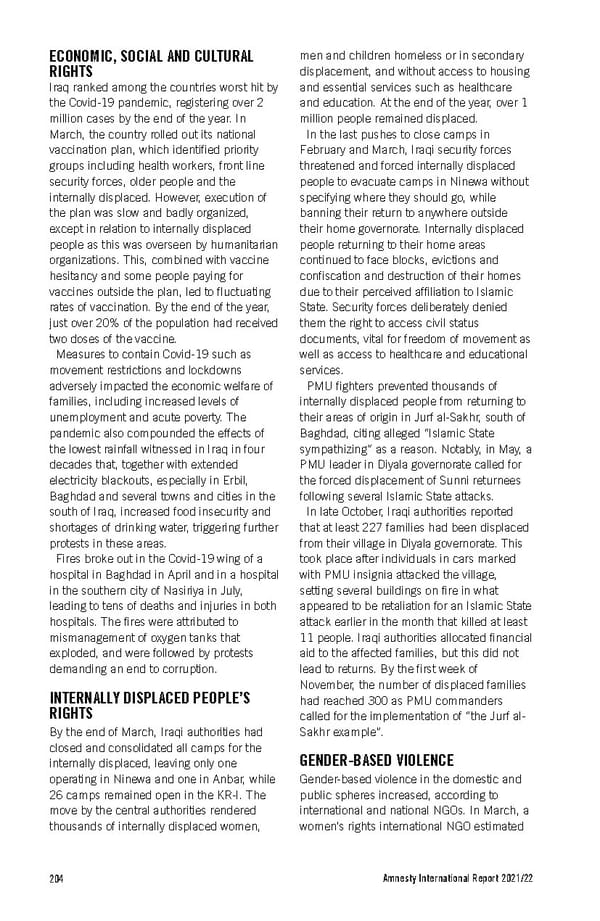ECONOMIC, SOCIAL AND CULTURAL men and children homeless or in secondary RIGHTS displacement, and without access to housing Iraq ranked among the countries worst hit by and essential services such as healthcare the Covid-19 pandemic, registering over 2 and education. At the end of the year, over 1 million cases by the end of the year. In million people remained displaced. March, the country rolled out its national In the last pushes to close camps in vaccination plan, which identified priority February and March, Iraqi security forces groups including health workers, front line threatened and forced internally displaced security forces, older people and the people to evacuate camps in Ninewa without internally displaced. However, execution of specifying where they should go, while the plan was slow and badly organized, banning their return to anywhere outside except in relation to internally displaced their home governorate. Internally displaced people as this was overseen by humanitarian people returning to their home areas organizations. This, combined with vaccine continued to face blocks, evictions and hesitancy and some people paying for confiscation and destruction of their homes vaccines outside the plan, led to fluctuating due to their perceived affiliation to Islamic rates of vaccination. By the end of the year, State. Security forces deliberately denied just over 20% of the population had received them the right to access civil status two doses of the vaccine. documents, vital for freedom of movement as Measures to contain Covid-19 such as well as access to healthcare and educational movement restrictions and lockdowns services. adversely impacted the economic welfare of PMU fighters prevented thousands of families, including increased levels of internally displaced people from returning to unemployment and acute poverty. The their areas of origin in Jurf al-Sakhr, south of pandemic also compounded the effects of Baghdad, citing alleged “Islamic State the lowest rainfall witnessed in Iraq in four sympathizing” as a reason. Notably, in May, a decades that, together with extended PMU leader in Diyala governorate called for electricity blackouts, especially in Erbil, the forced displacement of Sunni returnees Baghdad and several towns and cities in the following several Islamic State attacks. south of Iraq, increased food insecurity and In late October, Iraqi authorities reported shortages of drinking water, triggering further that at least 227 families had been displaced protests in these areas. from their village in Diyala governorate. This Fires broke out in the Covid-19 wing of a took place after individuals in cars marked hospital in Baghdad in April and in a hospital with PMU insignia attacked the village, in the southern city of Nasiriya in July, setting several buildings on fire in what leading to tens of deaths and injuries in both appeared to be retaliation for an Islamic State hospitals. The fires were attributed to attack earlier in the month that killed at least mismanagement of oxygen tanks that 11 people. Iraqi authorities allocated financial exploded, and were followed by protests aid to the affected families, but this did not demanding an end to corruption. lead to returns. By the first week of INTERNALLY DISPLACED PEOPLE’S November, the number of displaced families RIGHTS had reached 300 as PMU commanders called for the implementation of “the Jurf al- By the end of March, Iraqi authorities had Sakhr example”. closed and consolidated all camps for the GENDER-BASED VIOLENCE internally displaced, leaving only one operating in Ninewa and one in Anbar, while Gender-based violence in the domestic and 26 camps remained open in the KR-I. The public spheres increased, according to move by the central authorities rendered international and national NGOs. In March, a thousands of internally displaced women, women’s rights international NGO estimated Amnesty International Report 2021/22 204
 Amnesty International Report 2021/22 Page 203 Page 205
Amnesty International Report 2021/22 Page 203 Page 205